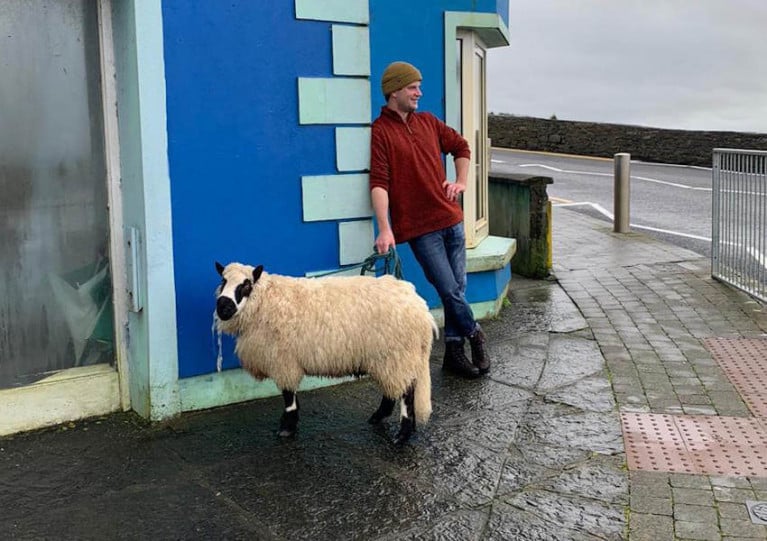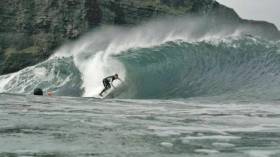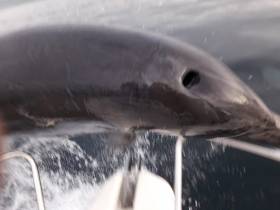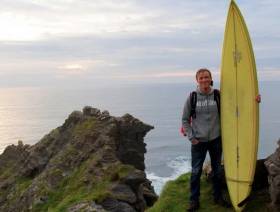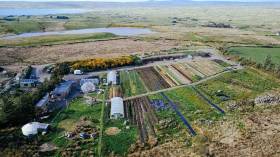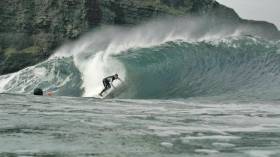Displaying items by tag: Lahinch
Swimmer With Head Injury Rescued in Lahinch
A sea swimmer was resuscitated after sustaining a head injury in the water at Lahinch in Co Clare on Saturday afternoon (1 October), as the Irish Examiner reports.
It’s understood that the woman casualty was retrieved from the water to the beach where a local surf instructor from Bens Surf Clinic performed CPR as others raised the alarm with emergency services.
The woman was subsequently airlifted by the Irish Coast Guard’s Shannon-based helicopter Rescue 115 to University Hospital Galway for treatment.
The Irish Examiner has much more on the story HERE.
Minister Humphreys Opens New Clare Water Safety Rescue Centre at Revamped Lahinch Leisure Centre
A €6m revamp of Lahinch Leisure Centre in Co Clare, which includes a dedicated water safety centre, has been officially unveiled today (Monday 18 July) by Minister for Rural and Community Development, Heather Humphreys.
The newly redesigned family-friendly, state-of-the-art facility features a 25-metre heated swimming pool, learner pool, sauna, steam room and jacuzzi besides the new Water Safety Ireland rescue centre.
A two-storey fitness gym overlooks the promenade and Liscannor Bay, with membership drawn from all over North and West Clare already exceeding 1,400 people.
Cllr Tony O’Brien, Cathaoirleach of Clare County Council, praised the wider community for its “steadfast support” for the development and he expressed his hope that future developments on site will further add to the amenities on offer.
“Today is about the future and a fantastic modern facility that is once again ready to serve another generation of residents and visitors to Lahinch, and the entire North and West Clare area,” he added.
Shane Talty, member of the board of Lahinch Leisure Centre and Cathaoirleach of the West Clare Municipal District said the upgrade is the first significant development on the site in more than 25 years and marks the beginning of a new phase of life for the historic community facility.
“The first development on this site was in 1963, when a forward thinking, progressive Community Development Association oversaw the provision of a dance hall and outdoor swimming pool,” Cllr Talty said. “That centre operated for the next 30 years, until the mid-1990s when a large-scale renovation saw the pool modernised and enclosed and an aquarium developed.”
 Cllr Tony O’Brien, Cathaoirleach of Clare County Council with Eoin Conlan, manager of Lahinch Lesiure Centre and Heather Humphreys, Minister for Rural and Community Development at the opening of the €6m revamp of the leisure centre | Credit: Eamon Ward
Cllr Tony O’Brien, Cathaoirleach of Clare County Council with Eoin Conlan, manager of Lahinch Lesiure Centre and Heather Humphreys, Minister for Rural and Community Development at the opening of the €6m revamp of the leisure centre | Credit: Eamon Ward
He continued: “The revamped facility opened in 1996 and served the community up to its closure in Dec 2019. By then, the structures had become dilapidated, the roof was badly leaking, and the pool plant room had reached end of life. Only the trojan efforts of the then Manager Joe Garrihy, his staff, the board chair Denis Creedon and the members somehow managed to keep the centre open for as long as they had.”
Cllr Talty noted that planning has already commenced regarding the proposed repurposing the community hall within the building and that further funding will be sought.
“Funding received under the department’s RRDF fund has also helped deliver new on-site public toilets as well as a new rescue centre developed by Clare Water Safety with our support in providing the required lands,” he added.
“We have been delighted with this model of collaboration between the Local Authority, Clare Water Safety and ourselves in making the centre a real hub for the community.”
Through funding support from the SEAI, the facility is a Nearly Zero-Energy Building (NZEB) delivering approximately €100,000 savings in annual energy costs. Additional funding from LEADER programme has delivered energy upgrade works to further heighten the environmental sustainability of the centre.
JADA Construction Ltd and Kelly RAC were the main contractors for the development while the design team comprised McKenna Consulting Engineers, Tom McNamara & Partners and Tipperary Energy Agency.
The facility upgrade has been funded by the Department of Community & Rural Development through the RRDF, the Sustainable Energy Authority of Ireland (SEAI), the TOMAR Trust, LEADER, Clare County Council and local fundraising. See www.lahinchleisurecentre.ie for further information.
Irish beaches need full weekend lifeguard service at the very least this summer, a Co Clare surfing instructor says.
Lahinch-based Ben Bennett told RTÉ’s Claire Byrne that lifeguard cover on Ireland’s coastal beaches lags behind that in the Frame and the UK, where “lifeguards have been on duty since Easter”.
This past weekend’s warm and sunny weather brought crowds to Lahinch where lifeguard service is not due to start until next weekend.
In its absence, staff at Bennett’s surf school volunteered on their days off to assist in multiple rescues, he says. The Irish Times reports on claims that 40 lives were saved at Lahinch over the weekend.
RTÉ News has more on the story HERE.
Water Safety Ireland has expressed concern about a proposal to ban the use of jetskis from a number of popular beaches on the Clare coastline.
As The Times Ireland edition reports today, Clare County Council proposes prohibiting the launching of all personal watercraft – as in jetskis – along with fast power craft, and power craft from Lahinch beach.
The draft bylaws also cover well-known west coast beaches at Miltown Malbay, Spanish Point, Doonbeg, Ballycuggeran (Killaloe) and Ballyallia lake near Ennis.
Additionally, the use of inflatable toys on all beaches in Clare may be banned under the proposed legislation, given the risks posed by their use and the number of incidents involving young children.
Water Safety Ireland (WSI) chief executive John Leech told the newspaper that jet skis or personal watercraft have proved invaluable in coastal rescue – particularly off the busy Clare coastline.
WSI believes zoning beaches for water users is preferable to an outright ban, he says.
The Irish Tow Surf Rescue Club has also objected to a jetski ban, while several of its members have registered personal opposition with Clare County Council.
The club has over ten jetskis equipped as rescue craft and has over 80 members. It has provided safety support to maritime events, including triathlons and open water swimming events off the west coast.
The club’s chair, Peter Conroy, who is a fireman, trained lifeguard and award-winning surfer, has worked with the emergency services for the past 17 years.
Conroy said that no personal watercraft owners in the Whitestrand or Spanish Point areas were consulted about the bylaws.
Conroy and others initiated the club in 2006 after an incident where he was surfing beneath the Cliffs of Moher in Clare and was trapped. He had to swim through 20-foot waves as jetskis used for towing surfers were unable to reach him.
He and his colleagues realised they should be able to train to rescue themselves.
Training has been conducted with the Irish Coast Guard, and the club also works with local swim groups in safety and in supplying the local community with life-saving equipment, including defibrillators, he said.
The British government is considering national legislation to classify jetskis as vessels – requiring their legislation and subjecting them to maritime laws covering all craft.
Clare County Council said its draft 2021 beach bye-laws are “ not scheduled to go before the members (councillors) for adoption until May at the earliest”, and it said it would be “ premature at this time to comment”.
Read more in The Times Ireland edition here
Lahinch Surfer Saves Local Sheep from Drowning
A surfer has spoken about his rescue of an “exhausted” and “marooned” sheep at risk of drowning off Lahinch, as Farming Independent reports.
Johnny Casey had been catching waves off the Co Clare town when he spotted the distressed sheep in a small cave at the foot of sea cliffs after it had fallen from the edge.
With the incoming tide putting the animal at serious risk of drowning, Casey raced to get help from the family that farms the land above before it was too late.
Farming Independent has more on the story HERE.
Surfing documentary Between Land and Sea will have its Irish TV premiere tonight (Tuesday 20 August) at 10.15pm on RTÉ 2.
Ross Whitaker’s film chronicles ‘a year in the life of an Atlantic surf town’, namely Lahinch in Co Clare — capturing the character of a coastal spot that experiences some of Ireland’s most spectacular waves, as previously noted on Afloat.ie.
Among its subjects is Fergal Smith, a former big wave pro surfer who switched to the more sedate world of organic farming — working at the literal grassroots with the local community.
Whitaker — who since directed the acclaimed boxing documentary Katie — toured Ireland with screenings to much applause two years ago, and now the whole nation will have an opportunity to see on TV after the UEFA Champions League match, and online via the RTÉ Player.
Update Wednesday 21 August: The film is now streaming on demand at RTÉ Player until 20 September 2019.
Dolphin Encounter In Tralee Bay Too Close For Comfort
O’Sullivan’s Marine have shared with us a photo of the surprise moment when a dolphin landed on the bow of one of their boats.
The sudden encounter was all the more startling as the marine mammal almost knocked a child out of the boat — but the youngster still managed to capture the cetacean on camera.
Elsewhere, BreakingNews.ie reports that a striped dolphin was found dead in a river near Lahinch despite the best efforts of local surfers after the animal live-stranded on the popular North Clare beach.
Dr Simon Berrow of the Irish Whale and Dolphin Group, who also joined the rescue effort, said: “We found a striped dolphin, quite a large animal, obviously in distress. We tried to push it out again [to sea] but it was very weak.”
The IWDG chief added: “The surfers did their best and we thank them for trying but sometimes a dolphin will live strand themselves … there’s very little you can do.”
The Man Who Swapped Big Wave Surfing For Life With God
#Surfing - He’s an Irish big wave surfer who’s credited with helping discover and naming the renowned Aileen’s break, near his home in Lahinch.
But more than a decade ago, John McCarthy traded the vices of the pro surfing lifestyle for a new life serving God, as the Irish Examiner reports.
Today, McCarthy is more easily found preaching the word of the Good Book at North Clare Community Church in Lahinch, which he co-founded and where he is an assistant pastor.
However, the born-again Christian still makes time for his former passion on the waves — especially since he and his wife run a surf school in the Co Clare coastal town, a place where fellow surfers have turned to organic farming as a way to seek peace in their lives.
And a new radio documentary, broadcasting tomorrow morning (Sunday 19 November) at 8am on Newstalk 106-108fm, follows McCarthy as he returns to the wave he named before he set on his new journey. The Irish Examiner has more on the story HERE.
Surfing Farmers Crowdfunding To Expand Organic Farm
#Surfing - Surfing farmers in Co Clare are hoping to raise €300,000 to expand their organic vegetable farm, as the Irish Examiner reports.
Afloat.ie previously highlighted the Moy Hill Community Garden started by Lahinch surfer Fergal Smith and fellow wave-riders Matt Smith and Mitch Corbett.
Now the big-wave surfers turned seed-sowers and field-diggers have launched a crowdfunding campaign to purchase 60 acres of land to expand their farm, which already grows enough to feed 50 families in the area.
The expansion aims to triple that number, as well as enable the planting of 30,000 native trees — with future plans including a ‘forest school’ for people “seeking balance and peace in their lives”, says Smith.
Thirty-six days remain in the fundraising campaign, with further details available HERE.
New Documentary Charts Lahinch’s Surfing Culture
#Surfing - Between Land and Sea is a new documentary on the surfing culture of Lahinch that’s currently touring with screenings around Ireland, as TheJournal.ie reports.
Chronicling ‘a year in the life of an Atlantic surf town’, Ross Whitaker’s film set out to capture the characters of the Co Clare coastal spot that’s become a gateway to some of Ireland’s most spectacular waves.
Big wave surfing isn’t just a sport for its top names — it’s a lifestyle. And the film gets to know a number of those who have made it their life’s work to get in harmony with their environment.
Among them are Ollie O’Flaherty, a regular at the Riley’s break at Lahinch as well as Aileen’s under the Cliffs of Moher, and Fergal Smith, the subject of two other recent films on the organic farming collective he’s helped establish for himself and fellow wave chasers.
Smith also features in Common Ground, a new film from Finisterre in which the surf clothing brand’s ambassadors — including women’s surfing pioneer Easkey Britton — met to share their challenges and achievements thanks to the power of the waves, as Huck reports.
Another recent surfing video from Red Bull shows what happened when Barry Mottershead invited American surfers Cody Thompson, Justin Quintal and Nate Zoller to taste the waves of the Wild Atlantic Way.



























